No California budget deal yet as Newsom, lawmakers approach big deadlines

SACRAMENTO — Gov. Gavin Newsom and Democratic leaders of the California Legislature worked Monday toward a final deal on a new state budget, leaving lawmakers in the awkward position of voting on their own spending plan — one that did not have Newsom’s support — a few hours before their annual deadline to take action.
Although both Newsom and legislators expressed optimism as negotiations continued into Monday night, the eventual agreement will mean substantial alterations need to be made in the bill adopted in party-line votes by the Senate and Assembly.
That plan, however, did meet the minimum constitutional standard for an approved budget to ensure that legislators won’t forfeit any of their pay.
Senate President Pro Tem Toni Atkins (D-San Diego) said the legislative plan relies on the substantial cash reserves the state has set aside since the Great Recession.
“Over the past decade, we’ve worked hard to be in a position to weather just such a storm,” Atkins said during Monday’s vote. “This budget enables us to weather it responsibly and with precision so that we avoid wreaking further havoc on Californians’ lives.”
No issue loomed larger over the negotiations than whether a portion of the state’s budget deficit — estimated at $54.3 billion — will be erased by billions of dollars in new coronavirus assistance yet to be approved by President Trump and Congress.
“We cannot encourage them more to move expeditiously,” the governor said on Monday of federal officials. “And I remain confident that something will happen at the federal level to help mitigate the impact of cuts at the state level.”
Newsom, who projected the state will need at least $14 billion in new federal money, asked legislators to be cautious and make cuts with an expectation that the money wouldn’t arrive. The legislative budget plan rejected that approach, choosing instead to assume the arrival of funds from Washington, and would impose additional cuts only if no help arrives by the end of September. Even then, lawmakers want to soften the blow in the event of a federal stalemate by tapping more of the state’s cash reserves.
A key debate has been how much to spend on K-12 education, which saw sweeping cuts under the governor’s May budget proposal. Lawmakers rejected those cuts, allowing schools to continue spending at existing levels, though a portion of that amount would have to be found in school reserve funds or through borrowing to be repaid later by the state.
School advocates have warned that the unprecedented shift to distance learning due to precautions taken to slow the spread of coronavirus would add to their burden. And though the budget offers one-time assistance with funds from the state’s portion of the federal CARES Act, education groups still have worried about how those dollars would be divvied up.
Local governments, too, were worried that even a budget more generous than Newsom’s preferred version would still come up short. The agreement is expected to provide only about one-third of $3 billion in lost tax revenues for counties, used to fund public and mental health programs, social services and public safety.
“Without continued investment in our safety net services, the dire consequences of poverty will be felt by even more Californians,” Los Angeles County Supervisor Hilda Solis said.
The protracted budget negotiations served as the latest example of tensions over how to govern California during the COVID-19 pandemic, an issue that recently led some legislators to accuse Newsom of usurping their authority while the Legislature was out of session.
Newsom and legislative leaders sought to downplay their disagreements on Monday, insisting the delay was due to the complexity of solving a historic budget deficit.
“I’m very pleased at the conversations we’ve been having,” the governor said during a midday event on the state’s coronavirus response.
More to Read
Sign up for Essential California
The most important California stories and recommendations in your inbox every morning.
You may occasionally receive promotional content from the Los Angeles Times.











